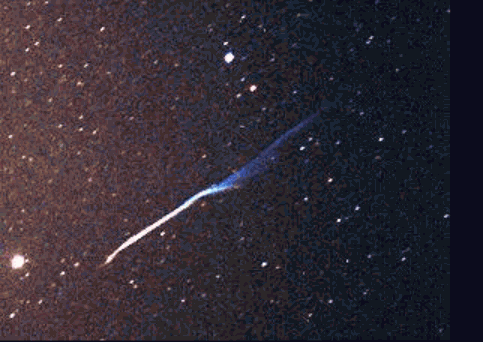Credit & Copyright: Paulo Raymundo
(Reaiche
Observatory)
animation courtesy Tony Phillips (SpaceWeather.com)
Explanation:
This dramatic four-frame animation shows a fireball meteor and its
developing persistent "smoke" train, recorded two weeks ago in
skies near
Salvador, Brazil.
Indeed similar sights are astonishingly familiar world-wide to
witnesses of this November's fireball-rich
Leonid meteor storm.
A few skygazers even discovered
that some bright Leonid fireballs made faint, gentle,
hissing sounds(!), a surprising effect only recently
appreciated and understood.
Accounts of fireball
meteors making noise have long been
viewed
with skepticism, particularly because sounds were
reportedly heard just as the meteor was seen overhead.
But light travels much faster than sound so, like delayed
thunder from
a distant lightning stroke, a
meteor produced sound should only
be heard long after the
meteor streak was seen.
A
sound explanation supported by
laboratory
tests is that turbulent
plasma created by the meteor's passage
generates very low frequency radio waves.
Traveling
at light speed the radio waves reach the ground
simultaneously with visible light where they are strong enough to induce
oscillating currents
and
audible vibrations in common objects
like grass, leaves,
wire-frame glasses, and perhaps even dry, frizzy hair.
animation courtesy Tony Phillips (SpaceWeather.com)
1999 2000 2001 2002 2003 2004 2005 2006 2007 2008 2009 2010 2011 2012 2013 2014 2015 2016 2017 2018 2019 2020 2021 2022 2023 2024 2025 2026 |
Yanvar' Fevral' Mart Aprel' Mai Iyun' Iyul' Avgust Sentyabr' Oktyabr' Noyabr' Dekabr' |
NASA Web Site Statements, Warnings, and Disclaimers
NASA Official: Jay Norris. Specific rights apply.
A service of: LHEA at NASA / GSFC
& Michigan Tech. U.
|
Publikacii s klyuchevymi slovami:
sound - zvuk - bolid - Leonidy - Leonids 2001 - fireball
Publikacii so slovami: sound - zvuk - bolid - Leonidy - Leonids 2001 - fireball | |
Sm. takzhe:
Vse publikacii na tu zhe temu >> | |
